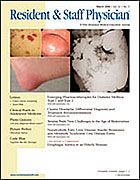Publication
Article
Celebrating 50 Years of Publication and Looking Forward
Author(s):
Charles E. Driscoll, MD,
Clinical Professor, Family Medicine, Department of Family Medicine, The University of Virginia, and Director, Lynchburg Family Medicine Residency Program, Lynchburg, Va
Resident & Staff Physician
It has been 6 months since I assumed the position of editor-in-chief of the journal, which seems an appropriate time to introduce myself to our readers. I received my medical education at the University of Iowa College of Medicine in 1971, after which I enrolled simultaneously in a residency in family medicine and a MSEd in Health Science at Ball State University in Muncie, Indiana. Since then, I have been engaged in the delivery of patient care, research, medical writing, and teaching family medicine in community, military, and university settings. Like you, I enjoy the stimulation provided by the challenge of assimilating scientific knowledge from a constantly changing medical literature and integrating it into the care for my patients. It is a privilege to join the editorial board of as it celebrates 50 years of publication; this journal has been a part of my medical "reading list" throughout my entire career.
Continuing in the tradition of excellence established by Drs Alfred Jay Bollet and Eric C. Rackow, editors-in-chief emeritus, my first priority is to move the journal toward a more vigorous use of evidence-based medicine as the foundation for articles. In my own medical education, the dogma of experts was often the principal basis for practice: "do this, or do that" was the rule because a particular group espoused that opinion. Though hearts were in the right place, the science was not there to support the opinions. Many recommendations I once based my practice on are now being done 180 degrees opposite to those original recommendations. The science has changed, and therefore I challenge all prospective authors to review the literature for randomized controlled trials to support their teaching points and, where possible, to provide likelihood ratios and specificity and sensitivity data. All the editorial content in this journal is peer reviewed, and reviewers are instructed to look for the quality of references and evidence used. I encourage all experienced physicians to contribute articles, supporting their own clinical experience with evidence-based data.
Next, I encourage residents and faculty to join forces and write as teams. Including perspectives of several authors in the same article enhances the teaching and ensures that the needs of learners are thoroughly met, while maintaining a rigor that stimulates accomplished clinicians. The journal strives to contribute new knowledge for residents and provide review of the material by their teachers.
Teachers and residency directors have a responsibility to establish and maintain an atmosphere of inquiry, and they can get more active in their advocacy of scholarship by partnering with their residents. Since both residents and faculty engage in teaching, I welcome submissions that provide "pearls" for improving methods of medical education. Competency-based education is now the learning paradigm prescribed by the Accreditation Council on Graduate Medical Education, and includes 6 competencies?patient care, medical knowledge, practice-based learning and improvement, interpersonal and communication skills, professionalism, and systems-based practice. You can enhance your contributions to the journal by asking yourself while preparing your manuscript: "Can I make this article address more than 1 of the 6 required competencies?"
Finally, I urge you to communicate to us constructive criticism or suggestions at any time. Our goal is to provide you with relevant information you can use, and we need to hear from you on how we are doing. Most of all, we hope you will tell us you want to continue reading and learning from the journal.
